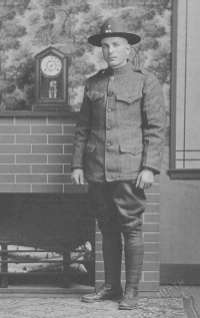Waukon, Iowa June 14th-- George Goeke
of Waukon, who recently returned from several months
of active overseas service and who was wounded and
captured by the Germans, tells interestingly of his
experiences.
Goeke was among the draft boys who left Waukon on
Feb. 25 last year, and was in training camps in this
country only two months, leaving New York April 25.
He was a member of Company E, 139th infantry, and
served with the 35th division. He was a battalion
runner and scout and his duties in the Argonne region
led him on many dangerous errands.
It was on September 29 that he left battalion
headquarters on what was destined to be his last
scouting errand of the war. He was detailed to cross
an open space and enter and search some buildings
which stood within 300 yards of the German lines,
with instructions to remain there to observe the
enemy movements and report back if any advance should
be commenced.
Shot by Sniper
He crept across the open space in safety and reached
a hedge in the road near the buildings and thinking
the hedge would protect he stood on his feet for a
moment when a bullet struck him in the abdomen. It
was fired by a sniper who located him by means of a
field glass. The bullet passed through his body and
out near the spine, and he fell face downward in the
deep mud where he lay from 10 o'clock a.m. until 4
p.m. when he was picked up by German soldiers, who
were advancing for a counter attack. His regiment had
been forced to retreat because of having advanced so
far that their flanks could not keep up with them.
Goeke lay there conscious all that time hopefully
awaiting the arrival of some of his comrades or his
sufficient recovery to creep back to the American
lines.
The Germans took him to a receiving station where he
spent the night. He was denied water and the sergeant
in charge refused him any drink but a more
accommodating corporal supplied him with beer at
intervals. But his wound, a serious one, was not
given the slightest attention. The next day, with the
assistance of two men he walked a mile to a first aid
dressing station. Here his clothes were taken from
him and his wound was washed out with alcohol and
dressed with a small piece of gauge and a paper
bandage. His wound received no further attention than
an occasional treatment of that kind, but it finally
healed.
Long Painful Ride
His next trip was to Sedan, France in a box car with
a box for a bunk with a straw tick on it. The weather
was chilly and he had no clothing but a undershirt
and only a blanket for a covering. His wound pained
him ___*_____ and prevented him lying down and the
torture ____*_____. ______*___ them a big reception
and they filled up with real appetizing food after
which they departed for France. While awaiting a
train at Stetsgard a German woman who could speak
English told him about the kaiser's abduction and
said she would like to shoot the kaiser for he had
caused all the German people misery.
After praising the wonderful country of America the
lady who George says was by no means bad looking
asked him if he were married. George told her he was
not and she very invitingly informed him that she was
also unmarried. Upon a little longer acquaintance
George thinks he might have brought her along home
with him. Another woman engaged him in conversation
on the train. She had formerly lived in Louisville,
Kentucky, for several years and she declared that had
the people of Germany known what the American
purposes were in the war they would have done away
with the kaiser long before. She told him that
President Wilson was coming to Europe and said the
German people feeding them after the war.
George said that he saw no prisoners subjected to
brutal treatment at any time, aside from neglect, but
he can fully testify to their inhumane treatment in
that regard. Wounds were given scarcely any attention
while patients were retarded and hindered from
recovery by the lack of providing food and water.
![]()
